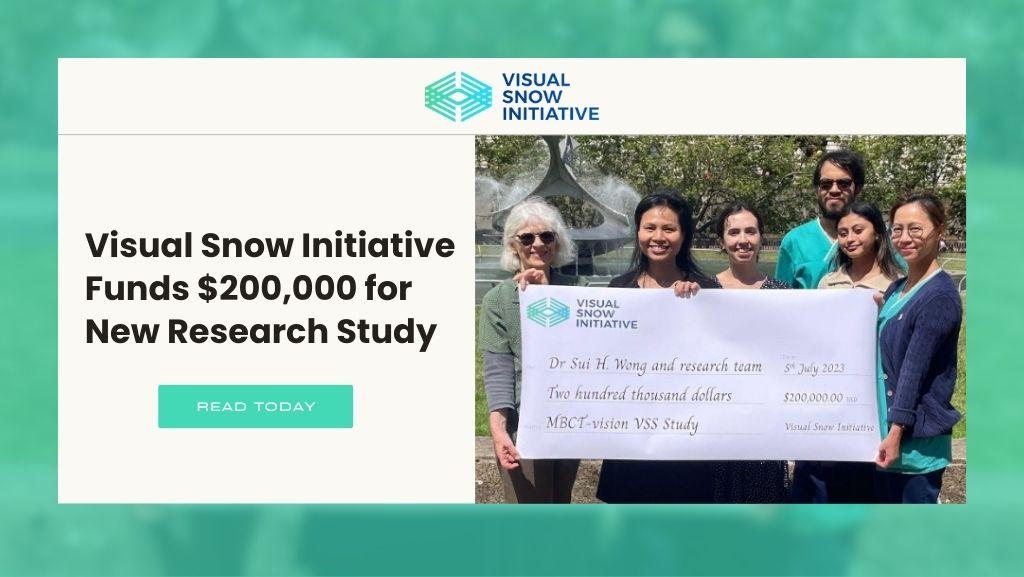Pictured from left to right: Dr. Janet Wingrove, Dr. Sui Wong and members of the research team, including Abi Orr, Andrew Amon, Saadia Chowdhury, and Isabelle Chow
We are excited to announce our funding for a new Visual Snow research study led by Dr. Sui Wong, a distinguished Neurologist and Neuro-ophthalmologist, Vice President of the UK Neuro-Ophthalmology Society, and Consultant for Guy’s and St Thomas’ NHS Foundation Trust.
Please visit the MBCT-vision website for additional study details, such as participation, protocol information, inclusion criteria, and more.
Continuation of the First-Ever MBCT Visual Snow Research Study
Dr. Wong conducted the first-ever Mindfulness-Based Cognitive Therapy (MBCT) program, specifically designed to address Visual Snow Syndrome symptoms. Partially-funded by the Visual Snow Initiative (VSI), Dr. Wong’s study marked the first-ever investigation of a cognitive behavioral and mindfulness-based intervention within the VSS patient population.
You can now access the full study in the Journal of Neuro-Ophthalmology:
Research into MBCT and mindfulness-based interventions has revealed enhancements in psychological resilience, physical health (including immune function), and neural changes associated with psychological well-being.
In recent clinical trials, MBCT has been modified by researchers to treat VSS and also target its visual symptoms (MBCT-vision), including trailing phenomenon, photophobia (extreme light sensitivity), and visual aura.
Study participants underwent MBCT to test its effectiveness at managing and improving the debilitating visual and non-visual symptoms of VSS. MBCT-vision, which refers to the use of MBCT to specifically treat visual symptoms, was used to address common visual phenomena associated with VSS, such as trailing phenomenon, photophobia, and visual aura.
The comprehensive program included weekly sessions and guided home practice to equip participants with valuable mindfulness techniques and cognitive strategies.
Study Outcome
Findings revealed that MBCT/MBCT-vision was successful in reducing a variety of VSS symptoms in the majority of the study participants. Researchers identified measurable, positive differences in brain activity for VSS patients after MBCT intervention.
As part of the study, brain scans were taken of the participants before, during, and after the MBCT program. In addition to symptom reduction, the imaging showed a significant increase in brain activity from the beginning to the end of the study.
Dr. Wong presented her findings at the 2023 North American Neuro-Ophthalmology Society Conference (NANOS), and her study, “Visual Snow Syndrome Improves with Modulation of Resting-State Functional MRI Connectivity After Mindfulness-Based Cognitive Therapy: An Open-Label Feasibility Study”, has been published in the Journal of Neuro-Ophthalmology.
Continuation & New Study: The Significance
These promising results show the necessity for further investigation into MBCT and its benefits for VSS patients.
As a result, VSI has now funded a second, larger Randomized Control Trial (RCT) involving MBCT and VSS. As part of the larger study, Dr. Wong will also be taking blood samples from study participants in search of biomarkers, which could reveal anomalies in the VSS patient population that could lead to more potential treatments and/or a cure.
Stay tuned for updates on MBCT towards better understanding and treating VSS.
For more information and answers to inquiries, please visit the MBCT-vision website or contact Dr. Wong and her research team at: research@MBCT-vision.co.uk
Your support can help make a positive difference in the lives of people affected by VSS worldwide. Thank you.


